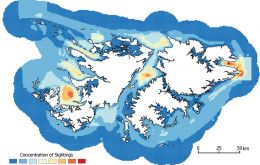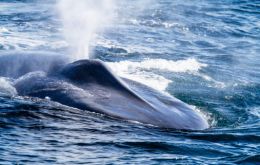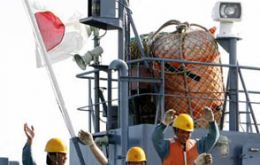MercoPress. South Atlantic News Agency
Tag: Minke whales
-
Thursday, May 31st 2018 - 08:20 UTC
Japanese whale hunt slaughters 122 pregnant minke whales

More than 120 pregnant whales were slaughtered in the latest Japanese whale hunt in Antarctica's Southern Ocean, new documents show, reigniting calls to step up efforts to stop the annual killing spree. A further 114 immature whales were killed as part of the so-called “scientific” whaling program, according to meeting papers from the International Whaling Commission's scientific committee meeting this month.
-
Wednesday, May 4th 2016 - 22:17 UTC
“Whale recovery in Falklands” and an explosion of sightings

”Whale recovery in Falklands’ waters was the subject of an article in Penguin News in October last year. It outlined the Marine Spatial Planning team’s efforts to capture the story of the mammal’s recovery.
-
Monday, March 28th 2016 - 05:55 UTC
Japan announces it has harpooned 333 whales in Antarctic waters; conservationists outraged

The Institute for Cetacean Research (ICR), the body behind the Japanese government’s whaling program, announced the return of the Japanese whaling fleet from its Antarctic operations. It is the first time that the Japanese whalers have returned to the Southern Ocean to slaughter whales since the International Court of Justice (ICJ) ruled its whaling program to be illegal in 2014.
-
Wednesday, September 30th 2015 - 07:25 UTC
Blue whales reported to be back in Barents Sea after a century

Blue whales are returning to the Barents Sea in the area of Svalbard, according to employees of Holland's Institute of Sea Research. The 17 species spotted means the mammals are returning to the region after a century of absence.
-
Wednesday, November 19th 2014 - 07:51 UTC
Greenpeace condemns Japan’s rush to resume Antarctic whaling

Greenpeace on Tuesday condemned the Government of Japan's rush to resume Antarctic whaling and called on them to abide by world opinion and the clearly expressed desires of the International Whaling Commission (IWC).
-
Wednesday, July 4th 2012 - 22:13 UTC
South Korea announces plans to start whaling for “scientific research”

South Korea said on Wednesday that it planned to start whaling through a loophole that allows the killing of whales for scientific research, following the lead of Japan's controversial expeditions.
-
Thursday, October 6th 2011 - 18:04 UTC
Dangerous skirmishes anticipated when Japan begins Antarctica whaling season

New Zealand joined Australia in criticizing Japan’s decision to resume whaling in Antarctic waters later this year and Tokyo's announcement that it will increase security for its whaling fleet.
